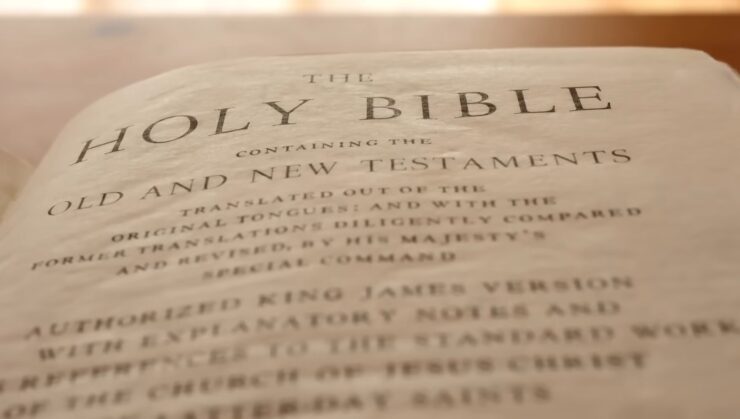The King James Version (KJV) of the Bible, first published in 1611, has been a cornerstone of Christian faith for centuries. Its poetic language and historic significance have endeared it to millions. However, with numerous translations available today, the question arises: is the KJV the best version of the Bible? This blog post delves into this topic, providing a comprehensive analysis for readers of all backgrounds.
The Historical Context

The King James Version was commissioned by King James I of England in 1604. Its purpose was to produce a Bible that would be acceptable to all branches of Christianity in England.
- The translation was a monumental task, involving 47 scholars over seven years.
- They relied on earlier translations like the Bishops’ Bible and original Hebrew and Greek texts.
Influence on Language and Culture
Impact on English language and culture is undeniable. Its phrases have infiltrated everyday language, and its literary quality is often praised.
- Many common phrases, such as “salt of the earth,” originate from the KJV.
- Its literary beauty has influenced countless writers and artists over the centuries.
The Language

One of the most celebrated aspects of the KJV is its poetic language. This characteristic has made it
a favorite for many who appreciate its literary qualities.
- The KJV often uses a rhythmic and lyrical style, making it memorable and impactful.
- Its language, though archaic, has a certain gravitas that many modern translations lack.
Accessibility and Understanding
However, the archaic language of the King James version can also be a barrier to understanding for contemporary readers.
- Words and phrases that were common in the 17th century may now be obsolete or have different meanings.
- This linguistic gap can lead to misinterpretations or difficulties in comprehension for modern readers.
Textual Accuracy and Scholarly Work

Since its publication, there have been significant advances in biblical scholarship and textual analysis.
- Discoveries of older manuscripts have provided more accurate source texts.
- Improved understanding of ancient languages like Hebrew and Greek leads to more precise translations.
Comparison with Modern Translations
When compared to modern translations, it may lack certain textual accuracies due to these advancements.
- Some verses are based on later manuscripts that are less close to the original texts.
- Modern translations benefit from centuries of linguistic and archaeological research, offering potentially more accurate renderings.
The KJV and its Theological Implications
It has played a significant role in shaping Protestant theology and practice.
- Its translation choices have influenced the interpretation of key doctrines and concepts.
- The KJV’s wording and phrasing have become ingrained in many Protestant traditions and beliefs.
Ecumenical Considerations
The KJV, however, is not without its critics in ecumenical contexts.
- Some argue that the language and translation choices reflect a particular theological bias.
- Other translations might offer a more neutral or diverse theological perspective.
Modern Worship
In many traditional worship settings, the remains the preferred Bible translation.
- Its familiar language and phrasing can evoke a sense of reverence and continuity with the past.
- The KJV is often used in liturgical settings for its poetic quality and solemn tone.
Challenges in Contemporary Settings
However, in contemporary worship settings, the language can be seen as a hindrance.
- Modern congregations may find its language inaccessible or irrelevant to modern life.
- This has led to a growing preference for more contemporary translations in many churches.
Impact on Individual Study and Reflection
For personal study and reflection, the language can be both a source of inspiration and a challenge.
- Many find the poetic language to be more conducive to reflection and meditation.
- Others may struggle with its archaic terms and expressions, preferring more straightforward translations for personal study.
Educational and Spiritual Growth
The KJV can also play a role in educational and spiritual growth, depending on the individual’s background and preferences.
- Studying can provide insights into the history of English literature and Christian thought.
- However, for those new to the Bible or with limited background in early modern English, more modern translations might be more beneficial for growth and understanding.
Its Role in Biblical Scholarship

In academic circles, the KJV is often studied for its historical and literary significance rather than its textual accuracy.
- Scholars appreciate the KJV for its impact on English literature and religious history.
- However, they generally rely on more recent translations for critical biblical studies.
Comparative Bible Studies
In comparative Bible studies, the KJV serves as a reference point for understanding the evolution of biblical translation.
- Comparing with other translations helps in understanding different interpretative choices and their implications.
- Such studies highlight the dynamic and evolving nature of biblical translation.
The KJV and Interfaith Dialogue
It has played a role in Christian ecumenism, serving as a common text among various Protestant denominations.
- Its long history makes it a shared cultural and religious artifact among many Christian traditions.
- However, its particular Protestant orientation can be a limitation in broader ecumenical contexts.
The KJV in Relation to Other Faith Traditions
When engaging with other faith traditions, the KJV’s language and style can be both a bridge and a barrier.
- Its literary quality may be appreciated by those of other faiths as a cultural treasure.
- Yet, its archaic language and Christian-centric perspective might limit its effectiveness in interfaith understanding and dialogue.
Personal Preferences
Many individuals have a deep emotional connection to often rooted in tradition and personal history.
- For some, the KJV is tied to fond memories and significant life events, making it a cherished version.
- This emotional attachment can greatly influence one’s preference for the KJV over other translations.
The Importance of Choice
Ultimately, the choice of Bible translation is a personal one, influenced by various factors including language, theology, and individual background.
- The KJV offers a unique experience due to its language and history, but it is one of many valid options.
- Recognizing the diversity of needs and preferences is key in respecting each individual’s journey with the Bible.
FAQ
How does the KJV compare to the original Hebrew and Greek texts?
While the KJV was translated from the best available Hebrew and Greek texts in the 17th century, modern translations benefit from more ancient and reliable manuscripts discovered since then.
Is it useful for academic Bible study?
Academically, the KJV is valued for its historical and literary impact, but scholars often prefer newer translations for in-depth textual analysis due to advances in linguistic and archaeological research.
Does it contain all the books found in the Catholic Bible?
The KJV, like most Protestant Bibles, does not include the Deuterocanonical books, which are found in Catholic Bibles.
How does the KJV influence modern English translations of the Bible
? Many modern translations are influenced by the KJV in terms of phraseology and stylistic choices, though they often use more contemporary language and benefit from recent scholarly insights.
Are there any revised versions of the KJV that update the language?
Yes, there are versions like the New King James Version (NKJV) that aim to maintain the stylistic and poetic quality of the KJV while updating the language for modern readers.
How do different Christian denominations view the KJV?
Views on the KJV vary among denominations, with some Protestant denominations holding it in high regard, while others prefer modern translations for clarity and accuracy.
Can it be a good choice for new Bible readers?
This depends on the individual’s comfort with early modern English. Some may find its language challenging, while others might appreciate its literary quality.
Conclusion
The King James Version of the Bible holds a special place in the history of Christianity and the English language. While its poetic language and historic legacy endear it to many, modern scholarship and linguistic accessibility favor newer translations. The choice of the “best” version depends on individual needs and contexts, ranging from scholarly study to personal devotion. Understanding the strengths and limitations of the KJV is crucial in appreciating its role in the broader spectrum of biblical translations.

